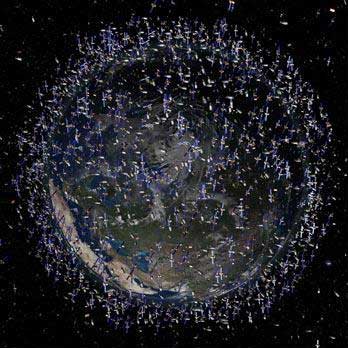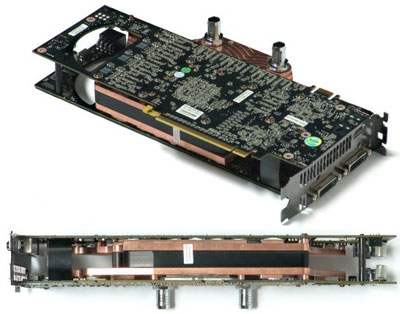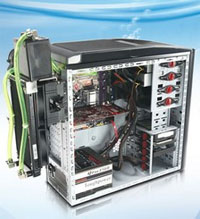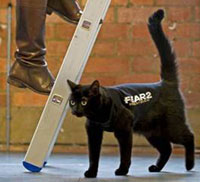In an unprecedented space collision, a commercial Iridium communications satellite and a defunct Russian satellite ran into each other Tuesday above northern Siberia, creating a cloud of wreckage, officials said today. The international space station does not appear to be threatened by the debris, they said, but it's not yet clear whether it poses a risk to any other military or civilian satellites.
"They collided at an altitude of 790 kilometers (491 miles) over northern Siberia Tuesday about noon Washington time," said Nicholas Johnson, NASA's chief scientist for orbital debris at the Johnson Space Center in Houston. "The U.S. space surveillance network detected a large number of debris from both objects."
He said U.S. STRATCOM routinely tracks about 18,000 objects in space, including satellites and debris, that are 3.9 inches across or larger. Tracking priority and "conjunction analysis" - identifying which objects may pose a threat to manned spacecraft - is the first priority.
"It's going to take a while" to get an accurate count of the debris fragments, Johnson said. "It's very, very difficult to discriminate all those objects when they're really close together. And so, over the next couple of days, we'll have a much better understanding."
Asked which satellite was at fault, Johnson said "they ran into each other. Nothing has the right of way up there. We don't have an air traffic controller in space. There is no universal way of knowing what's coming in your direction."
Iridium Satellite LLC operates a constellation of some 66 satellites, along with orbital spares, to support satellite telephone operations around the world. The spacecraft, which weigh about 1,485 pounds when fully fueled, are in orbits tilted 86.4 degrees to the equator at an altitude of about 485 miles. Ninety-five Iridium satellites were launched between 1997 and 2002 and several have failed over the years.
Asked if other satellites might be at risk, Johnson said "technically, yes. What we're doing now is trying to quantify that risk. That's a work in progress. It's only been 24 hours. We put first things first, which is station and preparing for the next shuttle mission."

Yeah - there's a lot hovering around our globe alright ..
»
Read full story
 That is gonna be a sexy solution for sure, expensive, but yeah, very sexy. Good news, we already have a sample inbound, expect some review lovin from us real soon. Anyway, BFG announced the availibility of their BFG GeForce GTX 295 H2O graphics card with ThermoIntelligence Water Cooling Solution.
That is gonna be a sexy solution for sure, expensive, but yeah, very sexy. Good news, we already have a sample inbound, expect some review lovin from us real soon. Anyway, BFG announced the availibility of their BFG GeForce GTX 295 H2O graphics card with ThermoIntelligence Water Cooling Solution. Japanese-based Princeton has
Japanese-based Princeton has 
 The scrumptious 65-inch Mitsubishi Laser TV got official back in 2008 and later rolled in production with shipping date announced in October. Its debut gained positive reviews nationwide, supposedly the next generation display to rival Plasmas and LCDs thanks to its wide color gamut ability and low energy consumption. It
The scrumptious 65-inch Mitsubishi Laser TV got official back in 2008 and later rolled in production with shipping date announced in October. Its debut gained positive reviews nationwide, supposedly the next generation display to rival Plasmas and LCDs thanks to its wide color gamut ability and low energy consumption. It
 In general, water-cooling has excellent cooling performance, gamers still face the fact that that will take too much space in the chassis and the radiators often are too small. Well .. meet Thermaltake's new liquid cooling system,
In general, water-cooling has excellent cooling performance, gamers still face the fact that that will take too much space in the chassis and the radiators often are too small. Well .. meet Thermaltake's new liquid cooling system,  Weird and strange advertising campaigns are nothing new, as game publishers and manufacturers attempt to grab just a second of the public
Weird and strange advertising campaigns are nothing new, as game publishers and manufacturers attempt to grab just a second of the public

 NVIDIA is hosting a new GeForce Windows XP/Vista 182.05 (32 and 64-bit) driver. The driver is tagged as BETA and up-to this moment we have no work on changes. Interesting though is the high build number.
NVIDIA is hosting a new GeForce Windows XP/Vista 182.05 (32 and 64-bit) driver. The driver is tagged as BETA and up-to this moment we have no work on changes. Interesting though is the high build number.